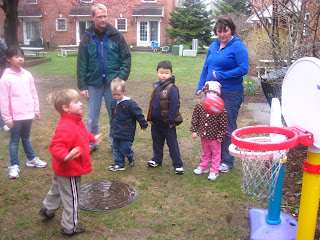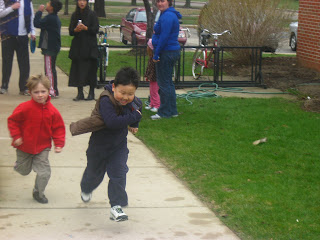And here is the manuscript:
There is a story that I have heard told many times around the dinner table or gathered with friends and family around the fireplace. It’s a story about an old man who lived alone. He didn’t always live alone. Once he had had a wife and a few children, but that was a long time ago. His wife had died and his children had all moved away, starting families of their own. One night he sat alone gazing out the window lost in thought. He watched as the wind blew big gusts of snow around the farmyard. It was bitterly cold out and a blizzard was coming in. He glanced at the fire burning in the hearth and was grateful for the warmth of his house. As he looked out the window again he saw them. A flock of Canadian Geese were struggling against the wind. They had landed in the space between his house and his barn and looked like they were trying to find shelter from the impending blizzard. His heart went out to them and resolved to open his barn and allow them to take shelter there from the storm. He put on his heavy winter coat, his boots, his gloves and his hat. He braced himself as he opened his door and walked towards the barn. He battled his way to the big barn door and pulled it open. He motioned for the geese to go inside. Instead of seeking shelter they ran away. Again and again he tried to convince them to go inside where they would be safe and warm and again and again they ran away from him in fear. In that moment he wished nothing more than to be like them, to be a goose, so he could reach them.
I imagine that in some way G-d felt a little bit like that man when he looked down on of the human race, except multiplied an infinite number of times. He had created the entire world and everyone in it. He had knit every human together and ordained all their days for them, but then something happened and they became separated from Him. Ever since that day in the Garden, that day when the first man and the first woman fell, the humans that G-d had created, the crown of his creation, had been separated from him. His heart continually went out to the human race. Throughout the Old Testament we read about G-d trying to draw the Israelites closer to Him. While the people of Israel were in the desert, G-d gave them the tabernacle, as a way for him to dwell among them. As time went on, He sent the prophets to draw Israel closer to himself, to direct them in the way they should go. The prophets though were just messengers of G-d. Even they pointed towards the coming of one greater, one who would restore Israel to a right relationship with G-d. In Isaiah 49 we read of one who was to come to restore Israel and to be a light to the gentile. This was the promise the people of Israel looked forward to. Until Christ came humankind remained separate from G-d. It was only after Christ came that we had the opportunity to be united with G-d.
What was it about this coming, of G-d as a baby, which allowed us to be united with G-d? What was different about G-d coming to humankind as a baby?
Our text this evening indicates that Christ came to us as a servant. A humble, obedient, servant. How does this servant nature allow us to be united with G-d and what does it mean for us to have the attitude of a servant?
If G-d had chosen to come to Earth in his full glory he would have been about as effective at drawing us to himself as the old man was at convincing the geese to seek shelter in the barn. In His full glory, G-d would have terrified us. He would have more than terrified us. We would not have been able to stand in the light of His glory. When the glory of the Lord was shown to Moses, the Lord hid Moses in the cleft of a rock so that Moses could only see the back of the Lord. For no one can see the face of G-d and live. The only way that G-d could reach us, the only way that he could draw us to himself, was to become like us. That is what he did when he sent his son to come and live among us.
Not only did Jesus have to come as a man in order that we would not be terrified of his glory, he also had to come as a man so that he could pay the debt that we owed. Our sins, our broken relationship with G-d, demanded repayment. Throughout the Old Testament we read about the types of sacrifices required for sins and the intricate rituals surrounding them. A common thread characterized all of them though: They were temporary and needed to be repeated, over, and over, and over again. They had to be repeated because they were not sufficient to fully pay for our sins. They were like bandaids where we, as G-d’s people, really needed reconstructive surgery. For a time they were okay, but in the long run, they just weren’t enough. We read in Ezekiel and the Psalms that each of us bears the weight of our own sins and that no animal or mere human could ever pay the debt that we owed. To borrow the words of the Heidelberg Catechism, we need a “mediator who is truly human, and truly righteous, yet more powerful than all creatures, that is, one who is also true G-d.”
Our mediator needed to be truly human and truly righteous because a sinner could never pay for the sins of themselves or another. One who has been dirtied by sin cannot stand in the place of another who has been dirtied by sin. He also needed to be true G-d so that he could bear the full weight of all our sins. Being in the very nature G-d, Jesus was also able to become the high priest that could live forever and continually intercede for us. Jesus became like a man, even though he was in nature G-d, he chose to become a human so that he could be our mediator. We read in Hebrews 2 that he became like us in every way so that he could help us. Because he was tempted when he suffered, he can help us when we are tempted.
This dual nature of G-d shown in Christ, truly G-d and truly human at the same time, this coming down from heaven to be a human baby, this emptying himself of the glory of G-d so that he could bring us back to G-d, this is what the nature of a servant really is. Think with me for a moment about a baby. A baby enters this world as a tiny, usually incredibly cute, human being. They are completely unable to do anything on their own except cry and soil their diapers. That is how Jesus entered our world, as a little helpless baby. He laid aside all his glory, all the riches of heaven, which are far greater than we can possibly imagine, to become a helpless baby. I cannot imagine anything more humbling than being completely helpless, than having to rely constantly on other people to meet your every need.
But Jesus didn’t stop there. He didn’t stop at just being a helpless baby. He went on to live a life marked by humility at every turn. Throughout his ministry he walked among the least of society. He touched lepers and other people considered untouchable. He had conversations with foreign women. He ate with tax collectors. And then perhaps the most well-known servant story of all: During the feast of the Passover Jesus knelt to wash the feet of his disciples. The washing of feet is a super dirty job; especially considering that Jesus and his disciples wore sandals and walked everywhere. It was a job reserved for the lowest of servants. But Jesus took it upon himself. Even though this story is often told as an example of the servant nature of Jesus, our text tonight points to another, even greater example of the servant nature of Jesus.
Look back with me at verse 8. Jesus humbled himself and became obedient to death, even death on a cross. Crucifixion in the time of Jesus was a punishment reserved so the lowest of the low, the scum of the earth, the slaves. There was no crueler, more humiliating form of execution. Every step of the crucifixion process was designed to bring more humiliation and pain upon the one to be executed. After Jesus was condemned to die by crucifixion, he was flogged. His hands were likely tied to a post as a Roman soldier whipped him again and again with a whip embedded with bits of metal. The whip would have torn through his flesh, his muscle and much of the underlying tissue. We also know that the Roman soldiers dressed Jesus in purple robes and put a crown made of thorns on his head and hailed him as “the king of the Jews”. The humiliation of this must have been extraordinary. Then, they paraded him through a crowded street where his enemies could jeer at him and taunt him more. Then, when they reached Golgotha, the soldiers would have stripped him of all his clothing, in order to add to his humiliation, before nailing him to the cross.
When our text says that Christ humbled himself to death on a cross, it was not speaking figuratively. Death on a cross was the most humble of deaths and it was the death that Jesus submitted to on our behalf.
So what does this mean for us? What does verse 5 of our text really mean for our daily lives when it says that our attitude should be the same as Christ Jesus? We cannot stand in the gap in the same way as Christ did because we are not truly G-d as He was. We are limited by our humanness. I also don’t believe that we are all called to die humiliating deaths by crucifixion. For one thing, crucifixion is not routinely practiced in North America to the best of my knowledge. For another, if all Christians were called to death by crucifixion, we’d have a lot of dead Christians. I think the key for us is humble obedience to whatever the Lord calls us to. We have all been given different spiritual gifts and we are called to certain tasks in accordance with our gifting. Some are called to be teachers, others are called to work with their hands, others to care for the sick, others to share the gospel in foreign lands, others to work the land, others to run large businesses. We each have a calling and that is where we are called to be obedient. It won’t look the same for everyone. My calling won’t look the same as yours and yours won’t look the same as that of the person sitting in the pew next to you, but it is in that calling that we are called to be obedient.
Being obedient to our callings won’t always be easy. Being crucified wasn’t easy for Jesus. When he prayed in the garden we read that he sweat drops of blood and pled with G-d to take this cup from him. A story is told about two young Moravians, members of a religious order, who heard of an island in the West Indies that was home to a slave plantation of two to three thousand slaves. The owner of the slave plantation is said to have said that no preacher or clergyman would ever stay on island. These two young Moravians heard about it and following G-d’s call on their lives, sold themselves into slavery in order to reach the slaves on the island. That was not an easy calling for these two young men to follow. It was not a short term mission trip, but a life sentence. Their families and friends questioned them in following their call. They thought it was crazy. But even Peter questioned Jesus’ call to go to Jerusalem to die.
Being obedient to G-d’s call on our lives won’t always be easy. Sometimes people will think we have lost our sense of reason, but when we allow ourselves to be humbled in obedience, that is when we will be exalted. When James and John, the sons of Zebedee, asked Jesus to let them sit on his right and left when he came into glory, he rebuked them and said that whoever wanted to be great, must first become like a servant, the one who wanted to be first must become the last. Our text this evening tells us that it was after Jesus had humbled himself and became obedient to death on a cross that G-d exalted him to the highest place and gave him the name that is above every name, that at the name of Jesus every knee should bow in heaven and on earth and under the earth, and every tongue confess that Jesus Christ is Lord, to the glory of G-d the Father.
As we enter into this final week before Easter, when we remember the great sacrifice that Christ made for us when he humbled himself to death on a cross and rejoice in the exaltation of his resurrection, may we be attentive to the calling that G-d has on each of our lives, to the ways that he is calling us to have the nature of a servant.
Let us pray.














































